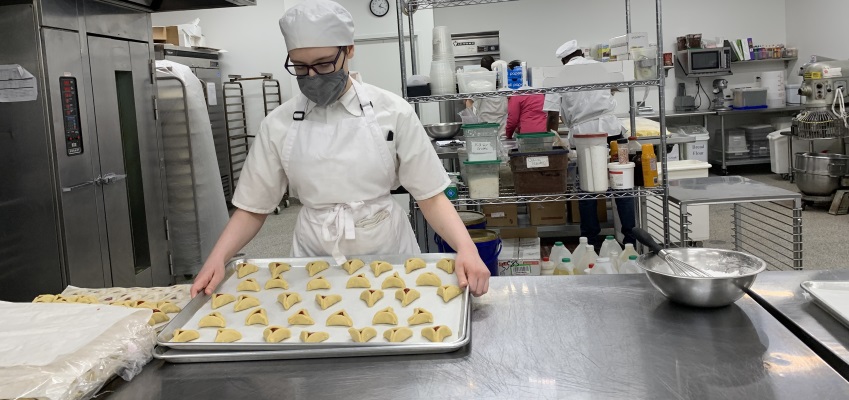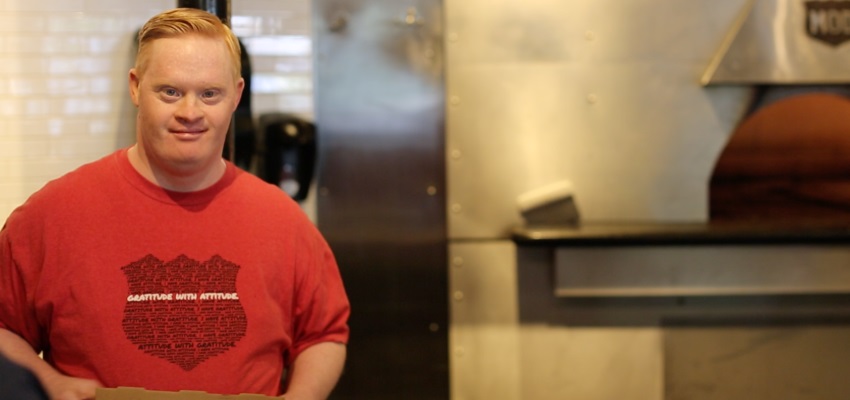Inclusive hiring: Welcoming workers with disabilities

Nonprofit Sunflower Bakery creates career opportunities for individuals with developmental disabilities.
The sweet smell of fresh cookie dough envelops you as soon as you step into the training kitchen at Sunflower Bakery in Rockville, Md. One trainee is meticulously cutting out flower cookies from rolled dough; another is mixing a large batch of chocolate chip cookie dough. Both have learning disabilities, but that’s not getting in the way of their dreams. The nonprofit Sunflower Bakery makes much more than cookies and pastries—it’s making career opportunities for individuals with learning differences. Graduates of the six-month pastry arts training program go on to work at bakeries and restaurants, providing an important source of employees.
As the industry faces a historic worker shortage, individuals with disabilities can help fill some labor gaps. Overall, 78% of operators report that their restaurant does not have enough employees to support customer demand, according to the National Restaurant Association’s 2022 State of the Restaurant Industry report. Meanwhile, less than one-third of disabled individuals, ages 16-64, were employed in 2021, according to the U.S. Bureau of Labor Statistics.
“Our students can become very valuable longstanding members of the team,” says John Katz, Sunflower’s director of programs. Stella’s Bakery in Rockville counts five Sunflower graduates among its 35 employees. “They’re doing a fantastic job. I’m really glad that I’m able to hire them,” says owner Stella Cawley, who puts the Sunflower graduates to work with tasks like rolling dough, cutting cookies and taking cakes out of pans. “Whatever they make, they do it with love and care,” she says.
An untapped workforce
Chip Byers knows firsthand the difficulties that people with disabilities face when job hunting. “I got turned down time and time again,” says Byers, an autistic individual. Eventually, he opened a franchise of Rita’s Italian Ice & Frozen Custard in Lake Buena Vista, Fla., with husband Andrew Byers. “When we opened, I said, ‘I’m going to give opportunities to people like myself who have been told they can’t work, because I know they can.’” Nine of the franchise’s 14 team members have a disability. They do everything from serving guests to washing dishes; several have risen to trainers or shift leads.
“A lot of the people we work with have never had jobs before, and on paper they don’t look like they’re going to be good workers,” says Chip Byers. No one has given them a chance—until now. “What we do is not charity,” Byers emphasizes. “We hire good, competent people.” Rita’s CEO and President Linda L. Chadwick visited the chain incognito as part of the TV series “Undercover Boss,” and was so impressed that she’s seeking input from the Byers on developing a companywide diversity and inclusion program.
Business benefits
Hiring individuals with disabilities is a win for everyone, says Robin Hamm, vice president of social impact for MOD Pizza, which employs over 230 workers with intellectual and developmental disabilities (IDD) at its 500-plus locations. “There are benefits to the person we hire, there are benefits to the community, and there’s a business benefit to MOD,” says Hamm.

Jeffrey, above, is a long-term employee of MOD Pizza, which espouses a culture of inclusivity and belonging.
Disabled individuals often face isolation. “The opportunity to work at MOD expands their social network,” says Hamm, building camaraderie and community engagement. They develop a strong sense of belonging and high levels of engagement, she notes. In turn, they stick around, saving the restaurant from posting another “help wanted” sign. “Retention for people with IDD is very high,” says Hamm, pointing to Jeffrey, a long-term employee and important contributor of the Bellevue, Wash., MOD Squad. “We love Jeffrey, and he loves us,” she effuses. Jeffrey folds pizza boxes, helps keep the store clean, assists with making pizzas, and loves to chat with customers. To celebrate Jeffrey’s contributions, in 2019, MOD offered a seasonal pizza named in his honor.
Katz, of Sunflower Bakery, notes that “we have graduates who have been in their jobs five to seven years.” Some get promoted to executive pastry chef or other leadership positions, “but many are not looking to move up. They’re just happy to be part of a team.” Knowing that you can rely on a team member year after year to consistently perform is a huge business benefit, says Katz, who worked as a restaurant and corporate chef before joining Sunflower.
Employers may also be eligible for a tax credit for employing individuals with disabilities. The Work Opportunity Tax Credit (WOTC) is a federal tax credit for hiring applicants from certain target groups who face significant barriers to employment. This includes individuals with physical or mental disabilities who receive Supplemental Security Income or who were referred to the employer by a vocational rehabilitation program.
Hiring and training tips
Try out these tips for welcoming individuals with disabilities onto your team:
Partner with disability organizations. The Lake Buena Vista, Fla., Rita’s works with several organizations contracted by the Florida Division of Vocational Rehabilitation, a federal-state program that helps people with physical or mental disabilities get or keep a job. For example, one organization places workers at Rita’s and foots the bill for 80 hours of job training. Contact your state vocational rehabilitation agency to find organizations to work with in your area.
MOD Pizza partners with Best Buddies, an organization dedicated to helping individuals with IDD. Not only does Best Buddies help place workers at MOD, but it also developed training materials for the restaurant specifically geared toward individuals with IDD.
Be open to different interviewing styles. Some individuals have difficulty with social interactions and might not engage in eye contact; others need extra time to process information. “Don’t just write someone off based on a five-minute conversation,” says Katz. “Understand that not everyone is going to be able to articulate why they should have that job, but they might just be the hardest worker you’ll have.”
Team up with job coaches. Organizations like Sunflower Bakery and Best Buddies provide job coaches for employees they’ve placed. Some coaches even tag along on shifts to help guide new recruits. Job coaches can also help with onboarding tasks that can be overwhelming, such as filling out paperwork and completing new-hire modules, Katz notes.
Ease employees into the job. “If you’re starting in new with someone with a learning difference, I always suggest that you don’t start with 40 hours right off the bat,” Katz advises. Timing is also important, he says. A holiday rush is not the best time to bring on employees who need extra training and time to come up to speed.
Offer supports and accommodations. Sunflower Bakery provides a number of supports to its trainees, including color-coded measuring cups and rolling pins with guides that measure the dough’s thickness. They’ve provided Braille directions for blind students and stools for those who need a seat while working. At Rita’s, the Byers provide scripts with responses to customer questions to help guide employees who need help with conversational skills.
Give clear directions and set expectations. Clearly specify tasks like how to stagger cookies on a baking pan, suggests Katz, so employees know precisely what you mean. Also helpful: checklists of procedures and recipes blocked off into easy-to-follow steps.
Be patient. When working with individuals with disabilities, “the key word is patience,” says Cawley of Stella’s Bakery. The training process often takes longer than with others, but the upside is getting long-term loyal employees.